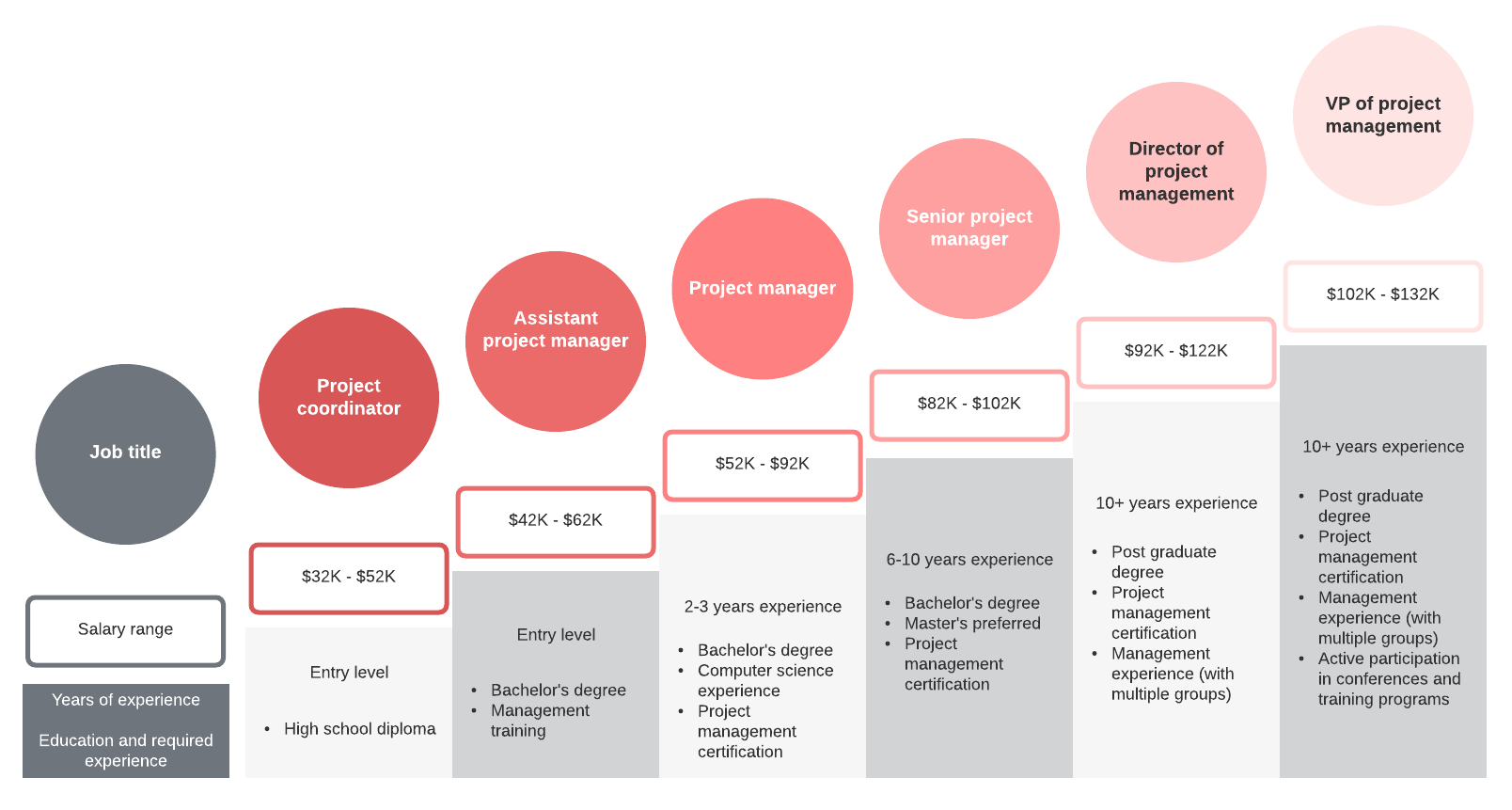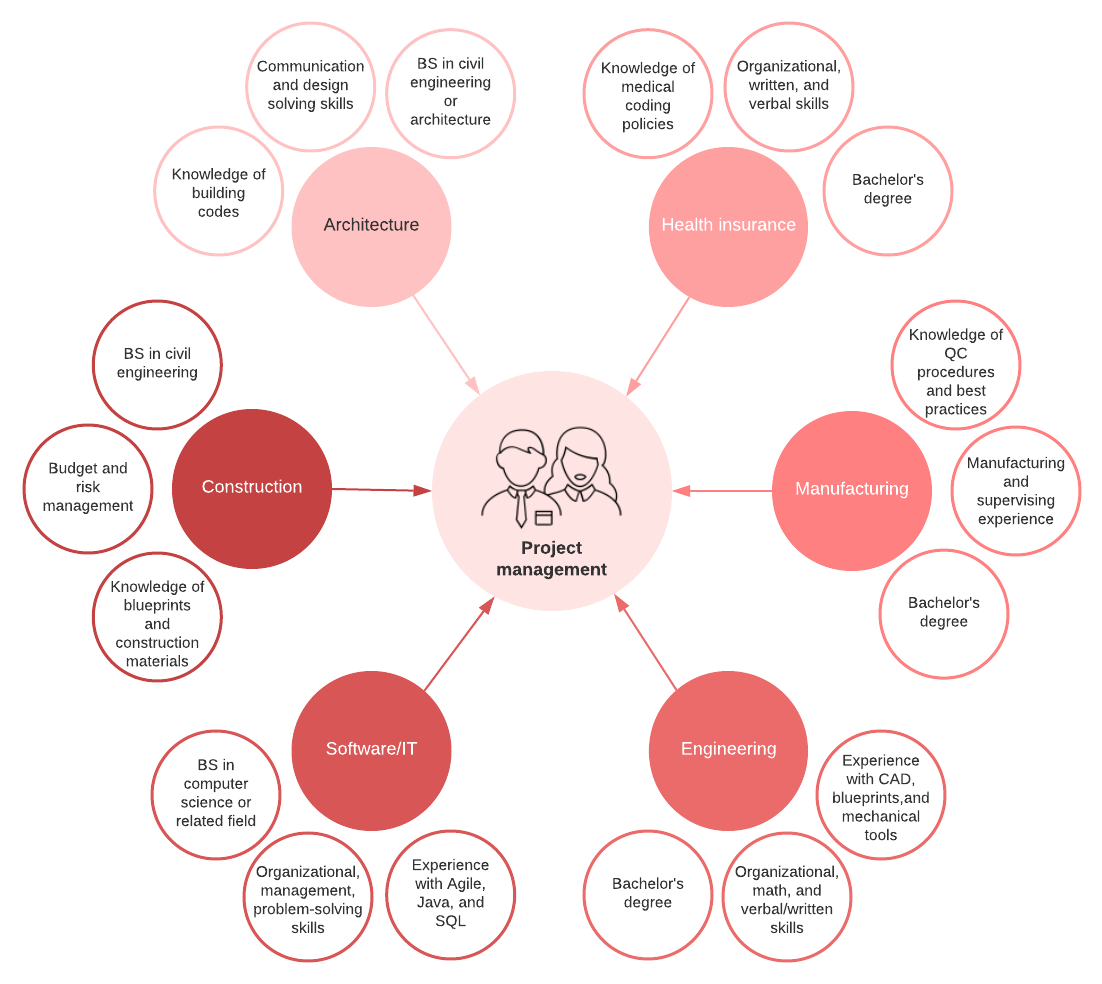
Why you should choose the project manager career path
Lucid Content
Reading time: about 6 min
Topics:
When you were young, you were probably asked the standard question, “What do you want to be when you grow up?” Your answer may have been one of the standards such as a doctor, a police officer, a fireman, a professional athlete, a veterinarian, a teacher, a scientist, an astronaut, a dancer, and a project manager.
Okay, none of you answered “project manager,” but maybe you should have. Read on the roles within and benefits of the project manager career path.
If you'd like a better understanding of what a project manager does, take a look at our reasons why project management is important.

Why choose a project management career path?
According to a report from the Product Management Institute, “Demand over the next 10 years for project managers is growing faster than demand for workers in other occupations.” The report projects that there will be almost 214,000 new project management-related jobs per year in the United States.
At the same time, the report notes that, while the demand for project management roles is increasing, the number of PM professionals is decreasing.
The need for project managers and the lack of qualified ones (basic supply and demand) makes project management positions attractive for a variety of reasons that we’ll discuss further in the article:
- Higher demand leads to higher salary.
- There’s a lot of opportunity for growth and advancement.
- Many industries can benefit from project managers, so you can likely work in an industry that matches your interests and skill set.
Expected salary for project managers
How much can you expect to earn as a project manager? Like any job, how much you make depends on your location, your education level, the amount of experience you have, the industry you work in, where you live, and the size of the company offering you employment.
According to Indeed, the average salary for a mid-level project management position is about $80,000 per year with a range from $22,000 to $174,000 (based on input from more than 23,000 people currently and previously employees with project manager titles).
Project manager titles
Project management is not a dead-end job. There are many different project management job titles, from entry- to executive-level, available as you move forward on your career path.
Consider this project manager title hierarchy as you work your way to the position that you want. The project manager career path typically includes the following roles:
- Project Coordinator: An entry-level administrative position for generating and distributing reports. The project coordinator is an assistant to the management team.
- Project Scheduler: This person uses software tools to manage project schedules. This job involves updating and maintaining schedules and other documents, but no team or people management.
- Assistant Project Manager: On really large projects, an assistant may be needed who can collaborate with and take on tasks that the project manager is not able to. For example, the assistant project manager can attend meetings and work with specific smaller segments of the project. The assistant meets regularly with the project manager to report on progress and any roadblocks that may come up.
- Project Manager: A project manager oversees the entire project, including budgets, plans, schedules, and product demonstrations. The project manager works alone, with an assistant, or with a management team that he can delegate specific assignments to. This person manages the project to a successful conclusion.
- Senior Project Manager: This position can be responsible for multiple projects at the same time and decides which should take priority. A senior project manager likely has a larger management team that includes project managers and assistants.

Types of project managers by industry
Project management is not limited to one industry. Project managers are needed in a variety of industries including the following.
Construction
A construction project manager understands the construction business, works directly with clients, obtains permits, plans the construction timeline, and manages contractors.
Qualifications and experience include:
- Bachelor's degree in Civil Engineering
- Understanding of how to read a blueprint
- Budget management experience
- Understanding of risk management
- Knowledge of construction materials
Architectural
An architectural project manager works closely with clients and often visits construction sites to consult with the construction project managers to make sure that the project is on track.
Qualifications and experience include:
- Bachelor’s degree in Architecture or Civil Engineering
- Knowledge of building codes
- Experience with solving design and construction problems
- Good communication skills
Health insurance
A health insurance project manager works with clients after claims have been made and manages projects related to coding, compliance, and reimbursement. In addition, responsibilities include managing documents and developing customer communications about policy changes and other types of updates.
Qualifications and experience include:
- Bachelor’s degree
- Knowledge of medical coding policies
- Good organizational skills
- Excellent written and verbal communication skills
Manufacturing
A manufacturing project manager maintains relationships between the company and clients to ensure that customer needs are met. In addition, a manufacturing project manager ensures quality control, sees that safety guidelines are followed, oversees the manufacturing process, and looks for ways to streamline processes.
Qualifications and experience include:
- Bachelor’s degree
- Experience with manufacturing
- Experience with supervising people
- Knowledge of quality control procedures and best practices
- Experience with customer relations and product fulfillment
Engineering
Engineering project managers are involved in every stage in the creation of a new product or the improvement of an existing product. They oversee the research, planning, development, design, and manufacturing. These project managers typically work with other stakeholders, such as the manufacturing project manager, to ensure overall satisfaction.
Qualifications and experience include:
- Good verbal and written skills
- Experience reading blueprints
- Experience with mechanical tools
- Proficiency with CAD programs
- Good math skills
- Excellent organizational skills
Software/IT
Software/IT project managers will normally have a background in software development, computer science, or information technology. This way they can speak the same language as the software development teams they are working with. Software project managers work in Agile environments and manage timelines, iterations, track bugs, demonstrate new features to clients, and so on.
Qualifications and experience include:
- Bachelor’s degree in Computer Science or a related field
- Knowledge of and experience with working in agile environments
- Experience writing code such as Java and SQL
- Strong organizational and management skills
- Ability to solve problems
Whether you are planning your own career path or helping other employees realize their potential, get started with our career progression chart. It can help you map a path through the various project manager levels to reach your ultimate goal.
Want to learn more about project management? Check out these articles to learn basic project management practices and the skills you’ll need to pursue this career:
Project Management for Beginners
5 Universal Project Management Principles
A Guide to Project Management Jargon
About Lucidchart
Lucidchart, a cloud-based intelligent diagramming application, is a core component of Lucid Software's Visual Collaboration Suite. This intuitive, cloud-based solution empowers teams to collaborate in real-time to build flowcharts, mockups, UML diagrams, customer journey maps, and more. Lucidchart propels teams forward to build the future faster. Lucid is proud to serve top businesses around the world, including customers such as Google, GE, and NBC Universal, and 99% of the Fortune 500. Lucid partners with industry leaders, including Google, Atlassian, and Microsoft. Since its founding, Lucid has received numerous awards for its products, business, and workplace culture. For more information, visit lucidchart.com.
Related articles
Project Management for Beginners
Follow our project management tutorial below to gain the fundamentals of project management and become the kind of organized project superstar that will gain you eternal fame and fortune… or at least a round of applause in the next team meeting.
The product manager career path
Product management ranks fifth on Glassdoor’s 2019 list of best jobs in America. But what exactly does a product manager do? And are you up to the task? Take a deep dive into the product manager career path.
Bring your bright ideas to life.
By registering, you agree to our Terms of Service and you acknowledge that you have read and understand our Privacy Policy.